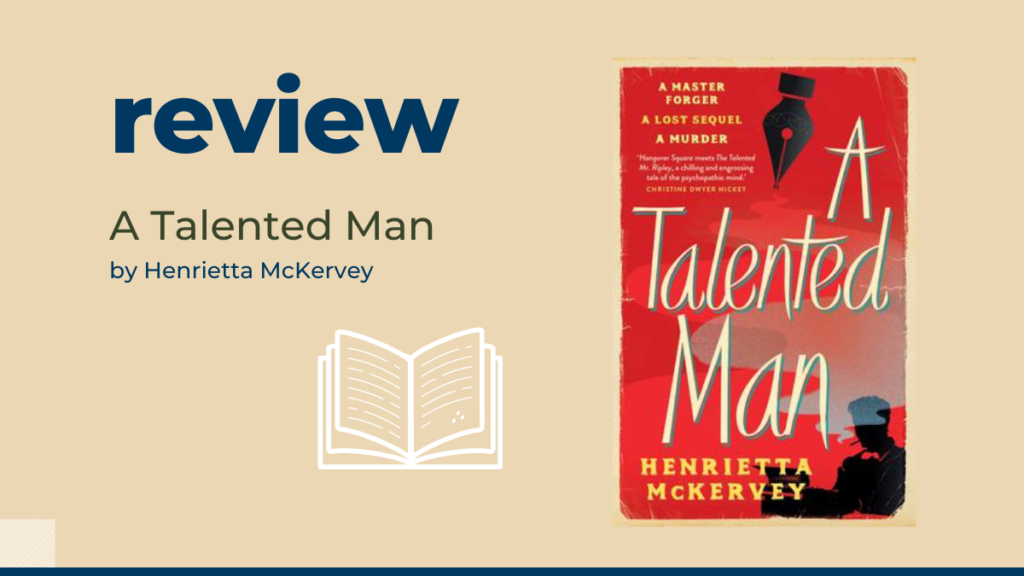
A Talented Man.
by Henrietta McKervey | Hachette Books Ireland | 304pp | £13.99 pb | 9781473682719.
Review by Tony Flynn
Ellis Spender is an aspiring writer and member of a once-esteemed society family, who believes that money, success and admiration are his birthright. All of these things allude him, however, until he embarks on a scheme to forge a sequel to one of the most famous novels of all time: Bram Stoker’s Dracula. This ‘discovery’, Ellis believes, will finally grant him the lifestyle that he feels was always his due. As his plan begins to develop, however, his story becomes one not only of forgery and deception, but also murder.
Has there ever existed in the history of popular literature a character more enduring and enigmatic than that of Count Dracula? Since his creation by Bram Stoker in 1897, he has been resurrected time and time again, in books, movies, television shows, graphic novels, etc. etc. The character, quite simply, refuses to die. This renders his author, Bram Stoker, a curiously poignant figure, because Stoker never lived to see just how beloved his work would become. Rather fittingly for an undead character, Dracula’s success exists only in Stoker’s afterlife, and the tremendous success of Bram Stoker is the success of a ghost.
It is in the footsteps of this ghost that Ellis Spender is determined to walk, and McKervey’s novel has the tone of a ghost story in many ways. It is essentially a story about the material world we pass through in our own mortality. Whether it be Ellis’s own fascination with Stoker’s office in the Lyceum theatre—‘If only he could lower himself into the chair Stoker had risen from! Write at the desk he had rested his head on’—or his painstaking fabrication of a manuscript written in Stoker’s hand, the novel is at its most fascinating when interrogating the relationship between the permanent and the perishable.
If it is in forgery that Ellis makes himself like a ghost, then it is in murder that he becomes, like count Dracula, a vampire: cunning, selfish, and willing to sacrifice anyone to ensure he can survive just a little bit longer. When the murder comes (and the cover of the book tells us it will) it is a moment of cold, violent ugliness. It is a truly harrowing thing to read. Through it all, however, McKervey does not lose sight of the material world around her characters, focusing on the details of the clothing and the trinkets that remain after Ellis’s victim has breathed their last. It makes the scene all the more horrific in seeing the simple, modest objects that have been left behind—the furnishings of a life now cut brutally short. Anyone who has ever lost a loved one and then been faced with the pain of sorting through the possessions that have been left behind will know how bittersweet even the most trivial of objects can become when filtered through the prism of someone whom we know once lived. We all, ultimately, haunt the objects and the world that we will inevitably leave behind.
In a world of such fragility, we anchor ourselves to physical things because they give us some sense of permanence in a world that is forever changing around us, but the object to which Ellis anchors himself is a fake. While Ellis pours his best writing into it, and even goes so far as to imagine it grants him a strange kinship with Stoker himself, it ultimately means little more to Ellis beyond the financial and societal gain he hopes it will grant him. It is that jealousy for a life that was never his by right which motivates him. Jealousy is why he forges, and jealousy is why he kills. He is a corrosive individual, striving at some form of immortality, even if he has to assume the life of another to achieve it. That is the irony at the centre of his broken being. His is not easy company to keep for 300 pages, but McKervey has written a fascinating and disturbing tale of deception and psychopathy that keeps the reader gripped from the first page to the last.
***
Tony Flynn recently completed the M.Phil. in Children’s Literature, Trinity College Dublin, and previously worked as an editorial assistant with Books Ireland. He now works at MoLI.











